150 Physics Teacher Interview Questions and Answers: Guide for Aspiring Educators
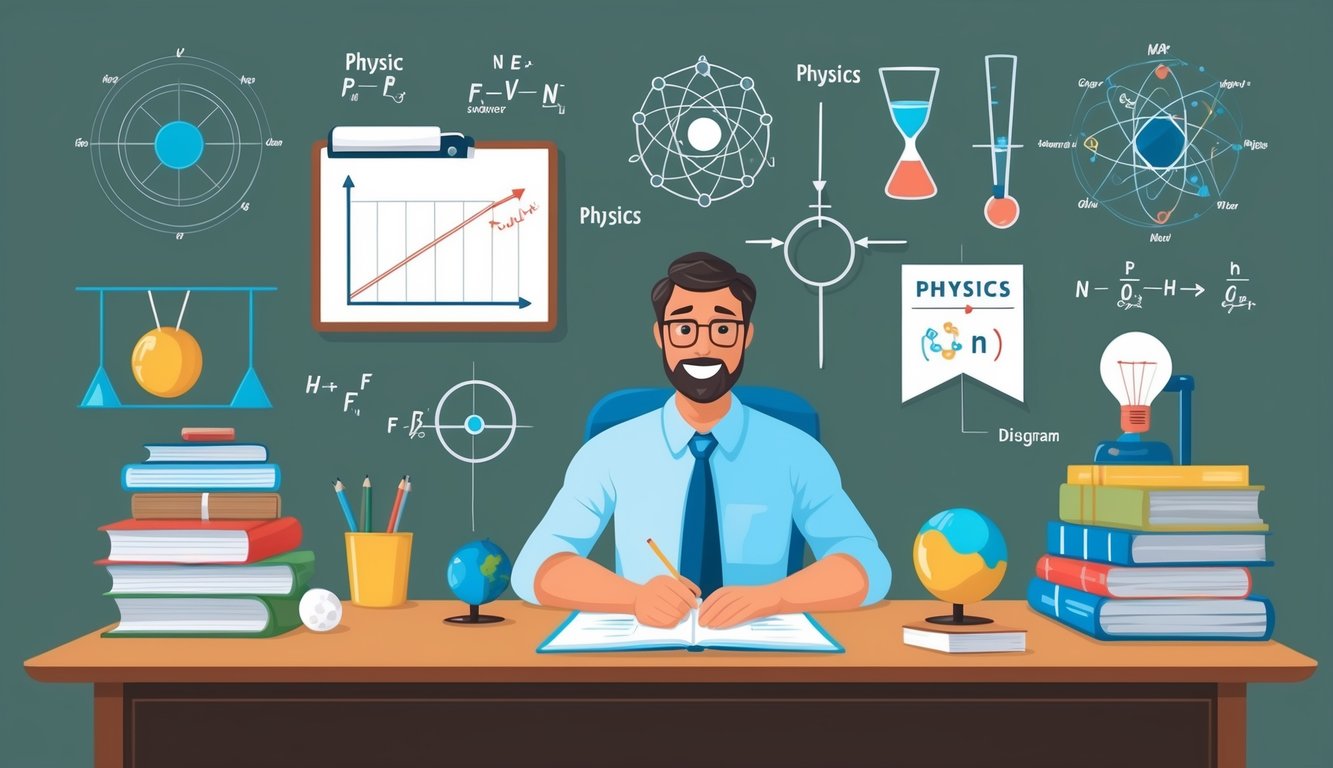
Walking into an interview for a physics teaching position can feel challenging. The key to success lies in preparation, understanding your teaching philosophy, and addressing common interviewer concerns.
This guide will provide you with 150 Physics Teacher Interview Questions and Answers to help you feel confident and ready for your interview.
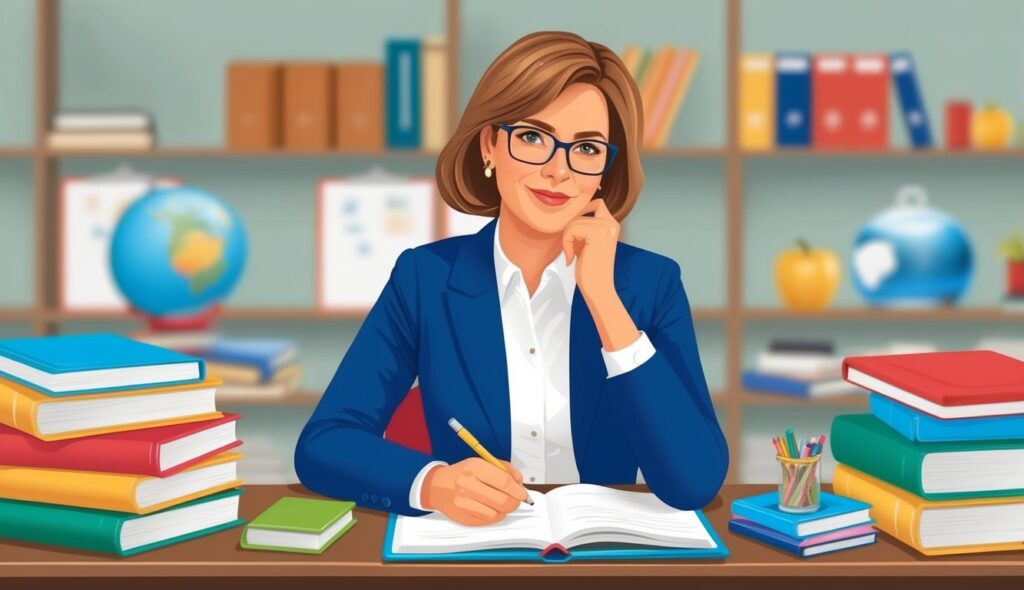
The questions cover various aspects, such as your background in physics and your approach to teaching complex concepts. By familiarizing yourself with these questions, you can effectively share your passion for teaching physics and communicate your unique approach.
Being prepared means you can offer thoughtful answers, showing you’re the perfect fit to inspire students.
Understanding the Role
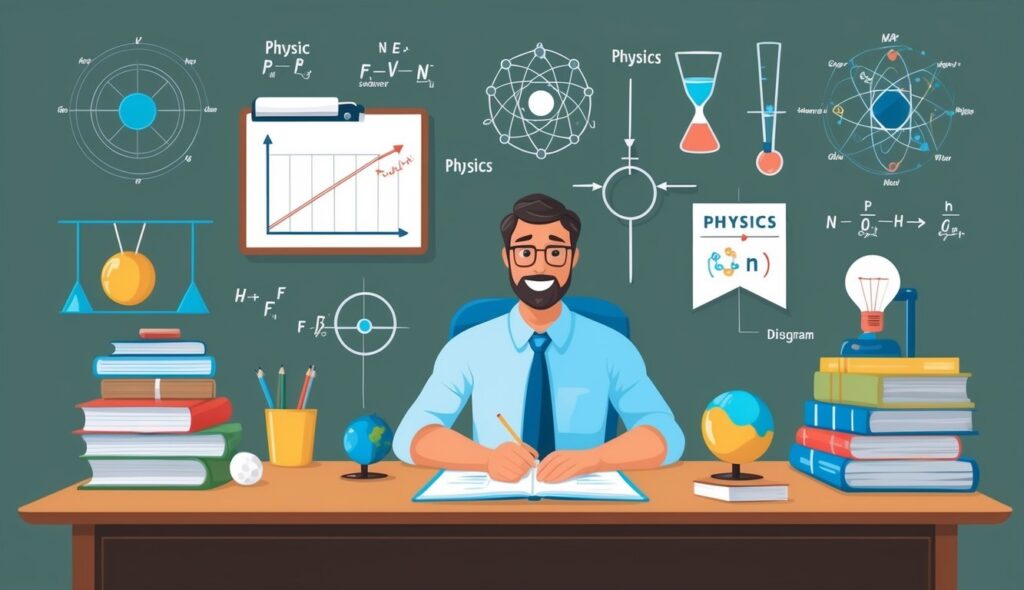
To be an effective physics teacher, you need a strong mix of technical skills and a genuine passion for both teaching and the subject itself.
This involves both communicating complex ideas clearly and inspiring students to explore and learn.
Skills Required for a Physics Teacher
Communication is key when teaching physics. You should be able to break down tough concepts into simpler parts. Using clear language helps students from various backgrounds understand.
Problem-solving skills are also crucial. Physics often involves tackling challenges. You’ll guide students in thinking critically and applying formulas effectively.
Patience and empathy are important traits. Not all students catch on quickly, so being patient helps. You need to adjust your teaching style to each student’s needs.
Technological skills can enhance learning. Using tools like simulations, interactive labs, or visual models makes lessons more engaging and accessible.
Consider classroom management techniques. Keeping order in the classroom ensures a suitable learning environment. Develop strategies to maintain discipline while fostering an encouraging space for learning.
Passion for Teaching and Physics
Having a strong passion for teaching and physics can make all the difference. If you love physics, it’s easier to convey excitement and curiosity to your students. Your enthusiasm can motivate them to engage and explore more deeply.
Continuous learning is also part of this passion. Stay updated with the latest physics discoveries and teaching methods. This shows students you value ongoing growth and learning.
Create a supportive atmosphere where students feel inspired. Encourage questions and exploration. Your passion for the subject can transform the classroom into a vibrant learning hub.
Find ways to make physics relatable and practical to life. Share real-world applications. This helps students see the value and relevance of what they’re studying.
Teaching Competencies
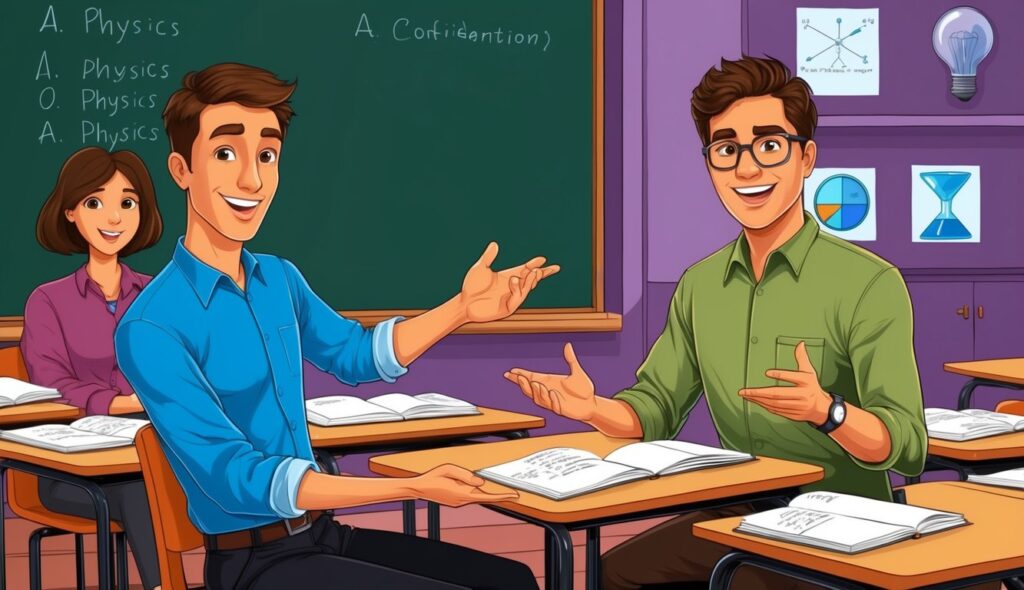
Effective physics teaching involves a mix of lesson planning, classroom management, and student assessment. By honing these skills, you can foster a positive learning environment and help students better grasp complex concepts.
Curriculum and Lesson Planning
Crafting a physics curriculum tailored to your students’ needs is key. Start by identifying the core topics and aligning them with academic standards. Plan your lessons to cover these topics in a structured manner. A well-structured lesson plan helps in maintaining a consistent teaching flow.
Incorporate various teaching methods to make lessons engaging. Use hands-on activities and experiments to provide practical experience. This not only clarifies theoretical concepts but also increases student engagement.
Consider differentiated instruction to cater to students with varying skill levels. By offering multiple ways to engage, students will have better access to the curriculum you offer.
Classroom Management and Student Engagement
Effective classroom management is crucial in maintaining an environment conducive to learning. Establish clear rules and expectations early on. This helps prevent disruptions and keeps students focused on the lesson.
Use interactive techniques to boost student engagement. Try group work, discussions, or practical problem-solving activities. These strategies keep students involved and make the learning process dynamic.
Maintaining open communication with your students can also enhance engagement. Encourage questions and feedback, making students feel valued and heard. By creating a welcoming environment, you make lessons more enjoyable for everyone.
Assessment and Evaluation Methods
Student assessment is a vital part of teaching. Implement a balanced mix of formative assessments to gauge student progress throughout the course.
Regular quizzes, assignments, and in-class activities provide insight into student comprehension.
Use evaluative methods that cater to the diverse learning styles in your classroom. Written tests, projects, or presentations offer multiple avenues for students to demonstrate knowledge.
Assessments should be fair and transparent. Use rubrics or scoring guides to maintain consistency. Providing students with feedback helps them improve and understand their strengths and areas for growth. Transparency in your evaluation process builds trust and motivates students to strive for improvement.
List of 150 Physics Teacher Interview Questions and Answers
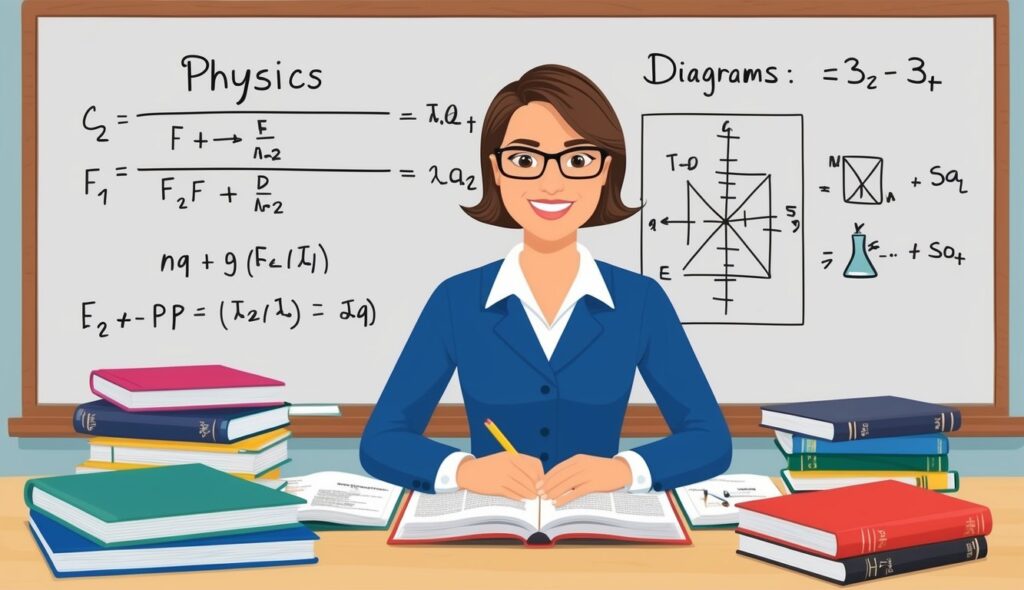
General Questions
- Tell us about yourself.
- Sample Answer: “I have a Bachelor’s degree in Physics and a Master’s in Education. I’ve been teaching high school physics for five years, and I’m passionate about making physics accessible and engaging for all students. I enjoy incorporating hands-on experiments and real-world applications into my lessons.”
- Why did you choose to become a physics teacher?
- Sample Answer: “I’ve always been fascinated by how the universe works. Teaching physics allows me to share that passion with students and inspire them to think critically and explore the world around them.”
- What is your teaching philosophy?
- Sample Answer: “My teaching philosophy centers around student engagement and inquiry-based learning. I believe that students learn best when they are actively involved in the learning process, so I strive to create a classroom environment that encourages questions and exploration.”
- How do you handle classroom management?
- Sample Answer: “I believe in setting clear expectations and creating a respectful classroom environment. I use positive reinforcement to encourage good behavior and address issues promptly and fairly when they arise.”
- Describe your experience with different teaching methods.
- Sample Answer: “I have experience with various teaching methods, including direct instruction, collaborative learning, and project-based learning. I adapt my approach based on the needs of my students and the specific content being taught.”
- What strategies do you use to engage students in physics?
- Sample Answer: “I use a mix of interactive demonstrations, hands-on experiments, and real-life applications to make physics relatable. I also incorporate technology, such as simulations and videos, to enhance understanding.”
- How do you assess student understanding?
- Sample Answer: “I use a combination of formative and summative assessments, including quizzes, projects, and class discussions. I also encourage self-assessment and peer feedback to promote reflection on their learning.”
- How do you differentiate instruction for diverse learners?
- Sample Answer: “I differentiate instruction by providing varied resources and activities that cater to different learning styles. For example, I offer visual aids, hands-on experiments, and opportunities for collaborative work to support all students.”
- What is your experience with technology in the classroom?
- Sample Answer: “I regularly use technology to enhance learning, including interactive simulations, online labs, and educational software. I also encourage students to use technology for research and presentations.”
- How do you incorporate real-world applications into your lessons?
- Sample Answer: “I often relate physics concepts to everyday life, such as discussing the physics of sports, transportation, or environmental issues. This helps students see the relevance of what they’re learning.”
Subject-Specific Questions
- Explain Newton’s Laws of Motion.
- Sample Answer: “Newton’s First Law states that an object at rest stays at rest, and an object in motion stays in motion unless acted upon by a net external force. The Second Law quantifies this relationship with F=ma, indicating that force equals mass times acceleration. The Third Law states that for every action, there is an equal and opposite reaction.”
- How would you teach the concept of energy conservation?
- Sample Answer: “I would start with a discussion on the law of conservation of energy and then use hands-on experiments, such as pendulum swings or roller coasters, to illustrate the concept. I would also incorporate real-world examples, like energy transfer in ecosystems.”
- What is your approach to teaching thermodynamics?
- Sample Answer: “I introduce thermodynamics by discussing everyday phenomena, such as cooking or weather patterns. I use visual aids and simulations to explain concepts like heat transfer and the laws of thermodynamics, followed by lab activities to reinforce learning.”
- How do you explain the concept of waves?
- Sample Answer: “I explain waves by first discussing their properties, such as wavelength, frequency, and amplitude. I use demonstrations with sound and water waves to illustrate these concepts and engage students in experiments to observe wave behavior.”
- What methods do you use to teach electromagnetism?
- Sample Answer: “I use a combination of lectures, demonstrations, and hands-on activities. For example, I might demonstrate magnetic fields with iron filings and then have students build simple circuits to explore the relationship between electricity and magnetism.”
- How do you approach teaching optics?
- Sample Answer: “I start with the basics of light behavior, such as reflection and refraction, using simple experiments with mirrors and lenses. I also incorporate technology, like ray-tracing software, to help students visualize optical phenomena.”
- Can you explain the concept of relativity?
- Sample Answer: “I introduce relativity by discussing the limitations of classical mechanics and the need for a new framework. I explain key concepts like time dilation and length contraction using thought experiments, such as the twin paradox, to make it relatable.”
- How do you teach quantum mechanics at a high school level?
- Sample Answer: “I focus on the fundamental principles and historical context of quantum mechanics. I use analogies and visualizations to explain concepts like wave-particle duality and uncertainty, and I encourage students to explore the implications of quantum theory in technology.”
- What are some common misconceptions students have about physics?
- Sample Answer: “Common misconceptions include thinking that heavier objects fall faster than lighter ones or that energy is ‘used up’ rather than transformed. I address these misconceptions through targeted discussions and experiments that demonstrate the correct principles.”
- How do you stay current with developments in physics education?
- Sample Answer: “I regularly attend workshops, read relevant journals, and participate in online forums. I also collaborate with colleagues to share best practices and new teaching strategies.”
Classroom Scenarios
- How would you handle a student who is struggling with the material?
- Sample Answer: “I would first identify the specific areas where the student is struggling and then provide additional resources, such as tutoring sessions or differentiated assignments. I would also encourage them to ask questions and seek help during class.”
- What would you do if a student disrupts the class?
- Sample Answer: “I would address the behavior immediately by reminding the student of classroom expectations. If the disruption continues, I would have a private conversation with the student to understand the underlying issues and determine an appropriate course of action.”
- How would you encourage a student who is disinterested in physics?
- Sample Answer: “I would try to connect the material to the student’s interests, whether it’s sports, technology, or another field. I might also share exciting physics-related news or experiments to spark their curiosity.”
- Describe a successful lesson you taught. What made it successful?
- Sample Answer: “One successful lesson involved a hands-on project where students built simple machines. The success came from their active engagement and collaboration, as well as the opportunity to apply theoretical concepts in a practical way.”
- How do you handle differing levels of ability in your classroom?
- Sample Answer: “I use flexible grouping and tiered assignments to cater to different ability levels. I also provide enrichment opportunities for advanced students while offering additional support for those who need it.”
- What would you do if a parent expressed concerns about their child’s progress?
- Sample Answer: “I would arrange a meeting with the parent to discuss their concerns and share my observations. Together, we would develop a plan to support the student’s learning, which might include additional resources or strategies.”
- How do you promote a growth mindset in your students?
- Sample Answer: “I encourage students to view challenges as opportunities for growth. I emphasize the importance of effort, resilience, and learning from mistakes, and I celebrate progress rather than just grades.”
- What techniques do you use to teach critical thinking in physics?
- Sample Answer: “I promote critical thinking through inquiry-based learning, where students ask questions and conduct experiments to find answers. I also use problem-based learning scenarios that require them to analyze data and draw conclusions.”
- How do you incorporate group work into your lessons?
- Sample Answer: “I incorporate group work by assigning collaborative projects and experiments that require teamwork. I ensure that each student has a specific role and that they reflect on their contributions to the group.”
- What role do you think homework plays in learning physics?
- Sample Answer: “Homework reinforces concepts learned in class and provides students with opportunities to practice problem-solving. I assign meaningful homework that encourages independent thinking and application of knowledge.”
Professional Development
- What are your goals as a physics teacher?
- Sample Answer: “My goals include continuously improving my teaching practices, fostering a love for physics in my students, and preparing them for future studies in science and engineering. I also aim to contribute to the broader educational community through collaboration and professional development.”
- How do you collaborate with other teachers?
- Sample Answer: “I collaborate with other teachers by participating in interdisciplinary projects, sharing resources, and co-planning lessons that integrate physics with other subjects, such as chemistry or mathematics.”
- What is your experience with curriculum development?
- Sample Answer: “I have participated in curriculum development teams where we aligned our physics curriculum with state standards. I contributed by providing input on lesson planning and assessment strategies.”
- How do you plan your lessons?
- Sample Answer: “I begin with identifying the learning objectives and then design activities that align with those goals. I incorporate various teaching methods and assessments to ensure a comprehensive approach to the material.”
- What resources do you use for lesson planning?
- Sample Answer: “I use a variety of resources for lesson planning, including textbooks, online educational platforms, and professional organizations. I also seek out peer-reviewed articles and attend workshops for new ideas.”
- How do you evaluate your own teaching effectiveness?
- Sample Answer: “I evaluate my teaching effectiveness through student feedback, self-reflection, and assessment results. I also seek input from colleagues and mentors to identify areas for improvement.”
- What is your experience with teaching labs?
- Sample Answer: “I have extensive experience teaching laboratory sessions, where I emphasize safety, proper technique, and scientific inquiry. I guide students through experiments that reinforce theoretical concepts.”
- How do you handle conflicts between students in your classroom?
- Sample Answer: “I address conflicts by facilitating a discussion between the students involved. I encourage them to express their perspectives and work together to find a resolution, promoting communication and understanding.”
- What do you think is the most important quality for a physics teacher?
- Sample Answer: “I believe that passion for the subject is the most important quality. When teachers are enthusiastic about physics, it inspires students to engage and develop an interest in the subject.”
- How do you prepare students for standardized tests in physics?
- Sample Answer: “I prepare students for standardized tests by incorporating practice questions into our lessons and teaching test-taking strategies. I also provide review sessions to reinforce key concepts and address any areas of concern.”
Advanced Topics
- How do you approach teaching advanced topics like relativity and quantum mechanics?
- Sample Answer: “I introduce advanced topics gradually, ensuring students have a solid foundation before diving in. I use engaging resources, such as documentaries and simulations, to make these complex topics more accessible.”
- What role does inquiry-based learning play in your teaching?
- Sample Answer: “Inquiry-based learning is central to my teaching approach. It encourages students to ask questions, conduct experiments, and engage in discussions, fostering a deeper understanding of physics concepts.”
- How do you teach the scientific method?
- Sample Answer: “I teach the scientific method through hands-on experiments where students formulate hypotheses, conduct investigations, collect data, and analyze results. This practical application helps them understand the process.”
- What strategies do you use to teach problem-solving skills?
- Sample Answer: “I teach problem-solving skills by modeling the process, breaking down complex problems into manageable steps, and encouraging students to work collaboratively to find solutions.”
- How do you handle students who are particularly advanced in physics?
- Sample Answer: “I provide enrichment opportunities for advanced students, such as independent research projects or advanced coursework. I also encourage them to mentor their peers, fostering a collaborative learning environment.”
- What is your experience with teaching physics online or in a hybrid model?
- Sample Answer: “I have experience teaching both online and hybrid classes. I utilize interactive tools and virtual labs to maintain engagement and ensure that students can access the material effectively.”
- How do you ensure safety in the physics lab?
- Sample Answer: “I prioritize safety by conducting thorough safety briefings before lab sessions, ensuring that students understand proper procedures, and providing safety equipment. I also supervise closely during experiments.”
- What is your approach to teaching math in physics?
- Sample Answer: “I integrate math into my physics lessons by showing its relevance to the concepts being taught. I provide practice problems that require mathematical application and ensure students understand the underlying principles.”
- How do you incorporate feedback from students into your teaching?
- Sample Answer: “I regularly solicit feedback from students through surveys and informal discussions. I use their input to adjust my teaching methods and address any concerns they may have.”
- What are some challenges you face as a physics teacher?
- Sample Answer: “Some challenges include addressing diverse learning styles and keeping students motivated. I continuously seek new strategies and resources to overcome these challenges and create an inclusive learning environment.”
Classroom Management and Environment
- How do you create a positive classroom environment?
- What techniques do you use to promote student collaboration?
- How do you handle late assignments?
- What is your strategy for managing group dynamics during projects?
- How do you celebrate student successes in your classroom?
- What steps do you take to ensure all students feel included?
- How do you address bullying or negative behavior?
- What classroom rules do you believe are essential?
- How do you encourage respectful discussions among students?
- What role does student feedback play in your classroom management?
Teaching Strategies and Techniques
- What methods do you use to teach complex concepts?
- How do you incorporate visual aids into your lessons?
- What role does storytelling play in your teaching?
- How do you teach students to formulate hypotheses?
- What is your approach to teaching scientific writing?
- How do you use formative assessments in your teaching?
- What strategies do you use to teach physics concepts to non-science majors?
- How do you incorporate current events into your physics curriculum?
- What techniques do you use to teach critical analysis of scientific literature?
- How do you adapt your teaching for students with special needs?
Curriculum and Standards
- What is your experience with national and state science standards?
- How do you integrate cross-disciplinary approaches in your teaching?
- What do you believe is the most important concept in physics for high school students?
- How do you ensure that your curriculum is up-to-date?
- What role does inquiry-based learning play in your curriculum?
- How do you incorporate engineering principles into your physics lessons?
- What is your experience with project-based learning?
- How do you align your lessons with standardized testing requirements?
- What resources do you use to develop your curriculum?
- How do you evaluate the effectiveness of your curriculum?
Professional Development
- What are your strategies for continuous professional development?
- How do you stay informed about the latest research in physics education?
- What conferences or workshops have you attended recently?
- How do you implement new teaching strategies learned from professional development?
- What role do professional organizations play in your teaching?
- How do you network with other physics educators?
- What is your experience with mentoring new teachers?
- How do you share your expertise with colleagues?
- What is your approach to peer observation?
- How do you reflect on your teaching practices?
Student Engagement and Motivation
- How do you inspire students to pursue careers in science?
- What strategies do you use to motivate reluctant learners?
- How do you create a sense of curiosity in your students?
- What role does humor play in your teaching?
- How do you encourage students to take ownership of their learning?
- What are your strategies for fostering a love of science in students?
- How do you help students set and achieve academic goals?
- What methods do you use to assess student motivation?
- How do you promote resilience in your students?
- What are your strategies for maintaining student interest throughout the school year?
Assessment and Evaluation
- How do you design assessments that measure understanding?
- What is your experience with alternative assessment methods?
- How do you provide constructive feedback to students?
- What role does self-assessment play in your classroom?
- How do you use assessment data to inform your teaching?
- What are your strategies for preparing students for practical exams?
- How do you assess student participation in class discussions?
- What is your approach to grading and reporting?
- How do you balance formative and summative assessments?
- What are your thoughts on standardized testing in physics?
Advanced Topics and Curriculum Depth
- How do you teach the concept of force and motion?
- What are your strategies for teaching atomic structure?
- How do you address misconceptions about gravity?
- What methods do you use to teach the laws of thermodynamics?
- How do you explain the concept of electromagnetic waves?
- What is your approach to teaching modern physics concepts?
- How do you incorporate historical context into physics lessons?
- What strategies do you use to teach the principles of fluid dynamics?
- How do you explain the significance of the scientific method?
- What are your methods for teaching conservation laws in physics?
Technology and Innovation
- How do you integrate technology into your teaching?
- What educational software do you find most effective for teaching physics?
- How do you use simulations in your lessons?
- What role does social media play in your professional development?
- How do you teach students to critically evaluate online resources?
- What is your experience with flipped classroom models?
- How do you incorporate virtual labs into your curriculum?
- What are your thoughts on using gamification in education?
- How do you ensure students are digitally literate in physics?
- What innovations in physics education excite you the most?
Community and Parental Involvement
- How do you engage parents in their child’s education?
- What strategies do you use to communicate with parents?
- How do you involve the community in your physics program?
- What role do you think parents play in a student’s success in physics?
- How do you handle concerns from parents about curriculum content?
- What events do you organize to showcase student learning in physics?
- How do you encourage parental support for science programs?
- What is your experience with science fairs or competitions?
- How do you communicate the importance of physics to the community?
- What partnerships have you developed with local organizations?
Challenges and Solutions
- What challenges have you faced in teaching physics?
- How do you adapt to changes in educational standards?
- What strategies do you use to overcome resource limitations?
- How do you handle resistance from students who dislike science?
- What do you do when students fail to meet expectations?
- How do you manage your time effectively in the classroom?
- What is your approach to dealing with burnout as a teacher?
- How do you maintain work-life balance?
- What strategies do you use to cope with stress in teaching?
- How do you envision your growth as a physics educator over the next few years?
This completes the list of 150 physics teacher interview questions.
Also Check: 150 Chemistry Teacher Job Interview Questions
Communication and Interpersonal Skills
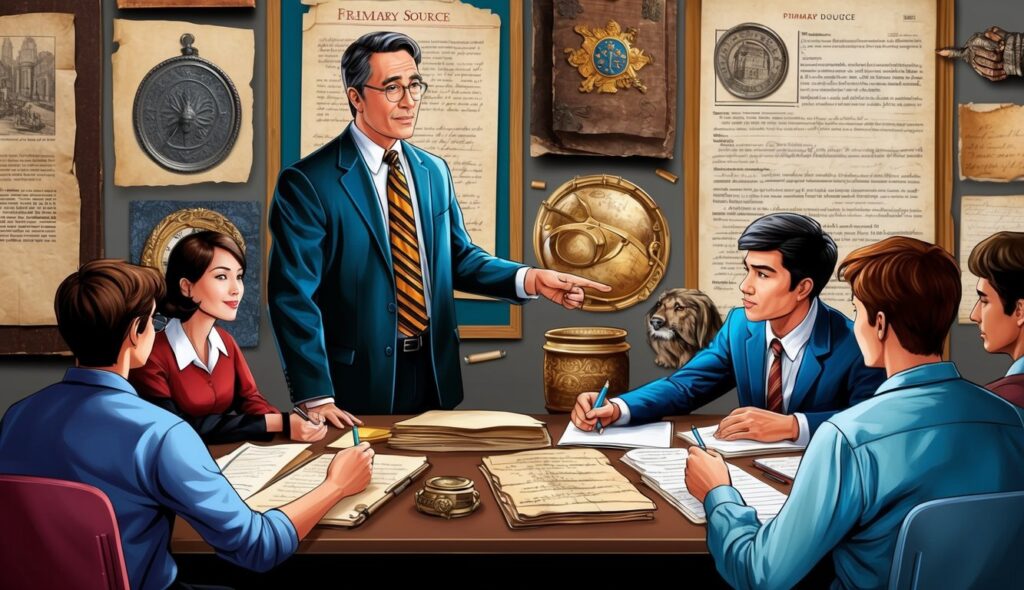
Effective communication and strong interpersonal skills are crucial for physics teachers. They help in delivering complex concepts clearly and work well with students and colleagues to enhance learning experiences.
Effective Communication Strategies
You should focus on adapting your communication to suit the understanding level of your students. Use simple language when discussing complex physics topics to make them more accessible. Encourage questions to ensure clarity and comprehension.
Incorporate visual aids, such as diagrams and videos, to convey ideas effectively. This not only makes your lessons more engaging but also helps students grasp abstract concepts. Active listening is crucial, as it allows you to respond appropriately to your students’ needs.
Frequent feedback is important. Provide constructive comments to guide improvement and boost confidence. This encourages an open dialogue and fosters a positive learning environment.
Collaborative Problem-Solving
Being a physics teacher often requires collaboration, both with students and other educators. Use group activities to promote collaborative learning, where students can tackle problems together, sharing insights and ideas.
Develop activities where students can work in pairs or small groups. This encourages peer learning and improves their ability to work effectively with others. Use real-world problems to make these activities relatable and engaging.
Facilitation is key. Guide discussions and help steer conversations in productive directions. Encourage each student to voice their ideas and be part of the solution-finding process. This not only builds teamwork but also enhances problem-solving skills.
Addressing Diverse Learning Needs
Understanding that each student is unique, you should tailor your teaching methods to accommodate different learning styles. Use a variety of instructional techniques to meet the diverse needs of your classroom.
Implement differentiated instruction to cater to varying abilities and preferences. This might include providing extra materials for advanced learners or offering step-by-step guides for those who need more support. Use multisensory approaches to target diverse learning styles, such as visual, auditory, or kinesthetic.
Cultural sensitivity is important. Acknowledge and respect the diverse backgrounds of your students. Adapt examples and scenarios to be inclusive, ensuring that every student feels seen and valued in your classroom.
Interview Preparation
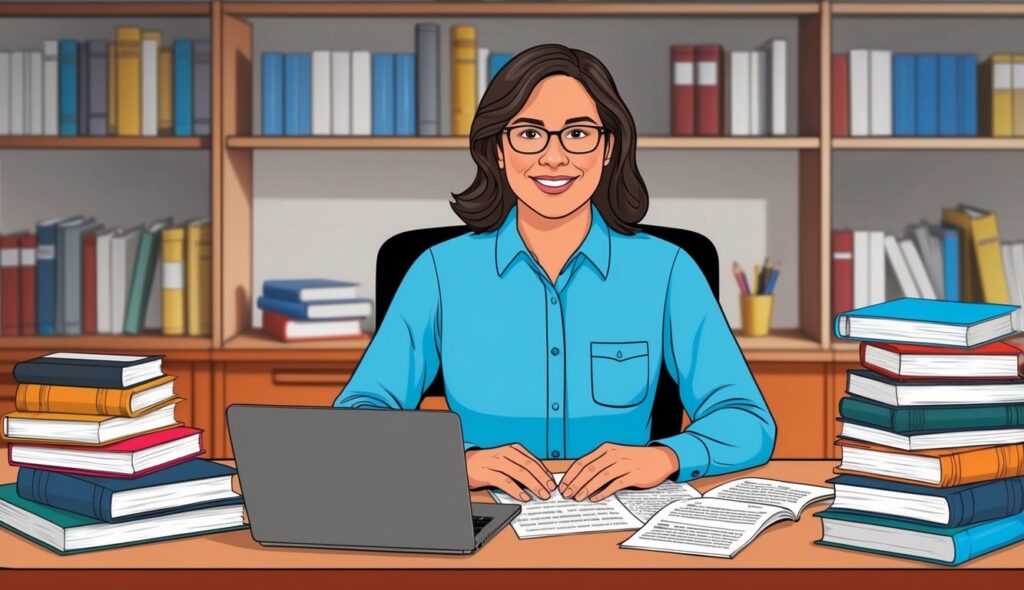
Preparing for a physics teacher interview involves understanding probable questions, linking your skills to the job, and sharpening your final strategies. Focus on demonstrating problem-solving skills and clear communication.
Commonly Asked Questions
Getting ready for your interview means knowing what questions might pop up.
Why do you want to teach physics?
This question gauges your passion. Explain why physics matters to you and how you plan to inspire students.
How do you handle difficult topics in the classroom?
Describe your strategies for breaking down complex ideas. Share examples that show your ability to make challenging concepts understandable.
What are your salary expectations?
Research typical salaries beforehand. Have a range, and be ready to justify it based on your skills and experience.
Bridging Skills and Experience
Connecting your past experiences with the role is key. Highlight how your skills make you a great fit.
Problem-solving skills: Provide examples where you solved a difficult problem, showing your logical thinking and patience. Mention any unique methods you used to achieve success.
Classroom management: Talk about your ability to maintain a positive and productive learning environment. Mention techniques you use for managing different student behaviors.
Use concrete examples. If you’ve led projects or used technology in the classroom, point out how these experiences prepare you for this teaching position.
Final Tips and Strategies
Stay composed and organized during your interview.
Revisit your resume and align your experiences with the job requirements. Be ready to discuss how each role has prepared you to teach physics effectively.
Maintain a confident body language. Make eye contact and offer a firm handshake.
Prepare questions for your interviewer. This demonstrates interest and engagement in the role. Questions might include: How do teachers collaborate? What are the school’s expectations for physics teachers?
Remember: Being prepared not only shows your interest but also sets the tone for a successful interview.
Frequently Asked Questions: Physics Teacher Interview
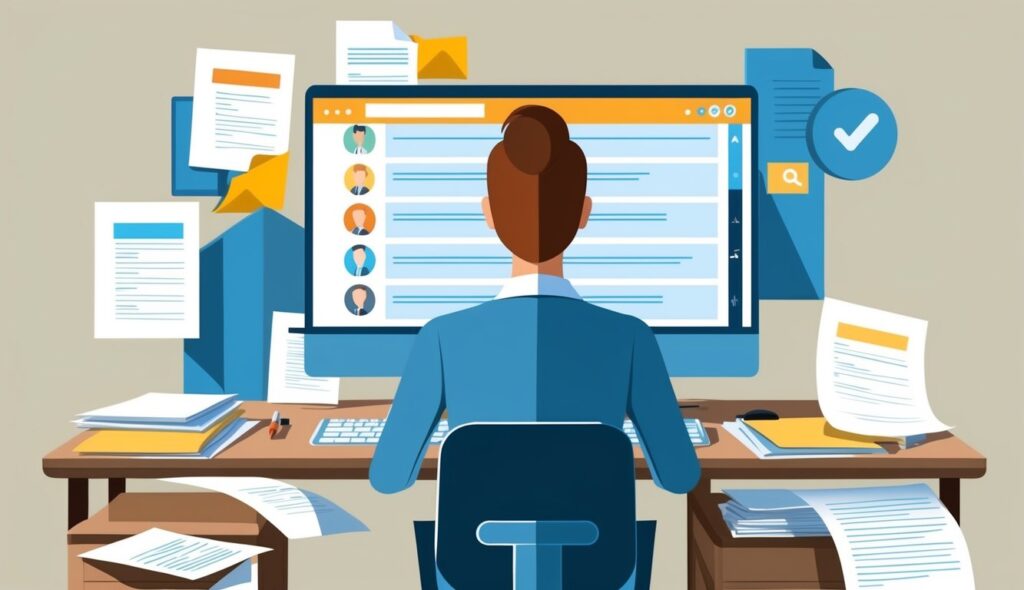
Explore techniques for teaching and assessing physics. Consider ways to adapt lessons for different learning needs and stay current with physics developments.
Can you describe a successful teaching strategy you’ve implemented in your physics classroom?
One effective strategy is using real-world examples to make abstract concepts relatable. You might show how physics applies in everyday life, like using roller coasters to explain energy conservation.
Hands-on experiments also engage students and reinforce their understanding through practical experience.
How do you explain complex physics concepts to students with varying levels of understanding?
Break down topics into smaller, simpler parts. Use visuals, analogies, and step-by-step explanations to cater to different learning styles.
Encouraging questions and fostering discussions are also vital in helping students grasp difficult ideas.
What methods do you use to assess student understanding and performance in physics?
Regular quizzes and tests are essential. Additionally, project-based assessments and lab activities can provide deeper insights into a student’s comprehension.
Consider incorporating peer assessments and self-evaluations to encourage reflection on learning.
How do you stay updated with the latest developments in the field of physics and education?
Attend workshops and conferences to learn from experts. Subscribing to academic journals and online courses is another way to stay current.
Joining professional organizations can also provide access to new research and educational strategies.
How would you differentiate your teaching to support students who have different learning needs?
Use varied instructional methods, such as visual aids, hands-on activities, and technology integration. Flexible pacing allows students to move at their own speed.
Providing additional resources and offering one-on-one support can ensure each student receives the help they need.
All the Best !






